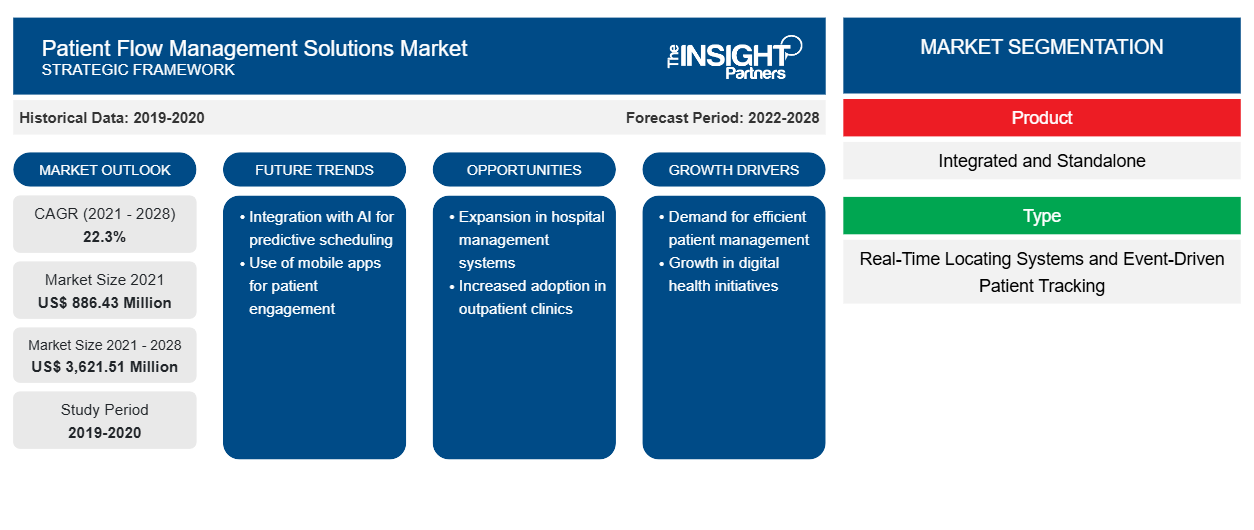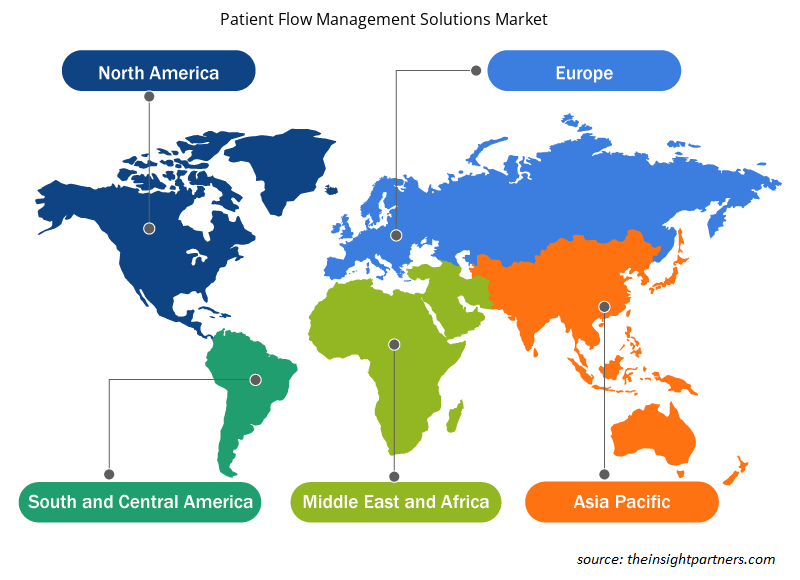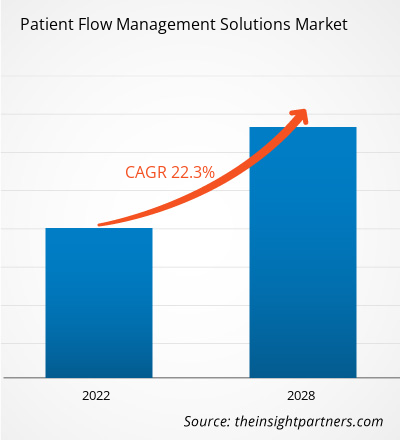The patient flow management solutions market is projected to reach US$ 3,621.51 Million by 2028 from US$ 886.43 Million in 2021; it is expected to grow at a CAGR of 22.3% during 2021-2028.
The market's growth is attributed to some key driving factors such as rising adoption of patient-centric approach, rising numbers of start-ups, and shortage of nursing staff and doctors are driving the growth of the global patient flow management solutions market. However, the shortage of skilled IT technicians and risks of cyber threats are hampering the market growth.
Patient-centric care is a healthcare system that establishes a partnership among practitioners and patients to ensure that important decisions support patients’ demands and needs. Wireless technologies have been built around the hospital environments through which patients and providers can manage personalized data. Smartphones are essential to change health-related behavior and manage hospital schedules. Internet-based tools also make healthcare practices easy and manageable by collecting healthcare information and offering services to enlighten patients about concerned physicists and provide details about their availability and appointment scheduling. Due to the availability of a wide variety of applications and easy access to them, many people have started using these tools to eliminate waiting time and get convenient appointments.
Commonly faced problems by hospitals, such as clinical mistakes, queues, delays, under and overcapacity utilization, patient acceptance in inappropriate settings, variability of workload, and stress for hospital staff are often related to poor patient flow management. Thus, shifting the approach from self-referential designs to a patient-centric and convenient approach promotes the patient flow management solutions market growth.
Customize This Report To Suit Your Requirement
You will get customization on any report - free of charge - including parts of this report, or country-level analysis, Excel Data pack, as well as avail great offers and discounts for start-ups & universities
Patient Flow Management Solutions Market: Strategic Insights

- Get Top Key Market Trends of this report.This FREE sample will include data analysis, ranging from market trends to estimates and forecasts.
You will get customization on any report - free of charge - including parts of this report, or country-level analysis, Excel Data pack, as well as avail great offers and discounts for start-ups & universities
Patient Flow Management Solutions Market: Strategic Insights

- Get Top Key Market Trends of this report.This FREE sample will include data analysis, ranging from market trends to estimates and forecasts.
Patient flow monitoring helps reduce wait time, provides insight, promotes on-demand services, and organizes versatile medical record keeping. A holistic virtual care platform based on patient flow data and unique devices designed for healthcare practitioners and patients allows them to have strategic plans to deploy required services across hospitals. More organizations are entering this market with the increasing adoption of patient flow management solutions in the healthcare sector. For instance, EmOpti, a US-based startup founded in 2015, offers a telehealth platform that is interoperable with patient electronic health records (EHR). The company offers an EmOpti Requestor consisting of a nurse device and a patient device. The company's hardware and software empower nurses to manage fluctuating patient volumes efficiently. Similarly, Tracworx, an Irish startup founded in 2016, provides real-time patient tracking software that aims to deliver reliable data on every stage of treatment. The business offers a wearable wrist device that records patients’ locations and sends data to the cloud for automated analysis, allowing hospitals to save money and time spent on patient tracking. As a result, the entry of start-ups in patient management solutions supports market expansion. Therefore, the factors mentioned above are driving the demand for patient flow management solutions.
North America held the largest market share for the patient flow management solutions market in 2021. The US held the largest market in North America for patient flow management solutions. The market is expected to grow due to the rising adoption of a patient-centric approach by healthcare providers and the shortage of nursing staff and doctors. Increase in demand for patient flow management solutions in hospitals and clinics in the US and increasing healthcare funding dedicated towards the development of IT-based solutions for healthcare characterize the growth in North America
Market Insights
Shortage of Nursing Staff and Doctors
The US is facing a severe shortage of physicians and nursing staff due to a surge in the aging population and impending retirements of older physicians. According to the Association of American Medical Colleges (AAMC), the US is expected to face a shortage of 120,000 physicians by 2030. According to the Global Strategy on Human Resources for Health Workforce 2030 forecasts, the global collective shortage of physicians, nurses, and midwives could reach 9.9 million by 2030. According to an article published in IndiaSpen, India has 1.7 nurses per 1,000 people, 43% lesser than the World Health Organization standard (3 per 1,000). Moreover, there were approximately 3.07 million registered nursing personnel in India in 2020. According to World Bank Group figures for 2017, there was 1 doctor for 550 people and 1 nurse for 425 people in China. Such shortage conditions translate into increased for patients, higher possibilities of mistakes, and lack of personal attention.
The limitations of manual patient flow management include the increasing difficulty of decision-making and the rising complexity of processes with the growth in hospital size. Moreover, decisions are not recorded in any system; knowledge sharing only relies on human interactions. Thus, shifting from manual scheduling and dispatching to automated patient flow management workflow offers solutions to the rising shortage of nursing staff and physicians worldwide and boosts the growth of the patient flow management solutions market
Product-Based Insights
The patient flow management solutions market based on product is segmented into integrated and standalone. In 2021, the standalone segment accounted for a higher market share due to higher adoption in small and medium-size healthcare organizations prefer standalone platforms to improve the quality and efficiency of patient flow management. However, the integrated segment is expected to grow at a CAGR of 23.0% in the forecast period due to the rising needs of a large population of patients and reducing or minimizing the costs associated.
Type-Based Insights
The type segment of the patient flow management solutions market is segmented into real-time locating systems and event-driven patient tracking. Event-driven patient tracking held a larger market share in 2021 and is anticipated to grow at a significant rate and accounted to grow at the CAGR of 22.0%.
Component-Based Insights
The component segment of the patient flow management solutions market is segmented into software, hardware and services. Software is the largest segment among the component segment in the patient flow management market in 2021. The segment is also anticipated to grow at a significant rate and is accounted to grow at the CAGR of 23.1%. Further, the services segment is subsegmented into consulting services, post-sale & maintenance services, and ongoing IT support & implementation services. These services help by reducing the waiting times, better handling of in as well as outpatient flow. Other than software and hardware, services facilitate additional support for enabling better patient flow management solutions.
Delivery Mode-Based Insights
The patient flow management solutions market, based on application, is segmented into on-premise, cloud-based, and web-based. In 2021, the web based segment held the largest share of the market. However, the cloud-based segment is also expected to grow at the fastest rate during the coming years.
Companies operating in the patient flow management solutions market adopt the product innovation strategy to meet the evolving customer demands worldwide, permitting them to maintain their brand name in the global patient flow management solutions market.
Patient Flow Management Solutions Market Regional Insights
The regional trends and factors influencing the Patient Flow Management Solutions Market throughout the forecast period have been thoroughly explained by the analysts at Insight Partners. This section also discusses Patient Flow Management Solutions Market segments and geography across North America, Europe, Asia Pacific, Middle East and Africa, and South and Central America.

- Get the Regional Specific Data for Patient Flow Management Solutions Market
Patient Flow Management Solutions Market Report Scope
| Report Attribute | Details |
|---|---|
| Market size in 2021 | US$ 886.43 Million |
| Market Size by 2028 | US$ 3,621.51 Million |
| Global CAGR (2021 - 2028) | 22.3% |
| Historical Data | 2019-2020 |
| Forecast period | 2022-2028 |
| Segments Covered |
By Product
|
| Regions and Countries Covered | North America
|
| Market leaders and key company profiles |
Patient Flow Management Solutions Market Players Density: Understanding Its Impact on Business Dynamics
The Patient Flow Management Solutions Market is growing rapidly, driven by increasing end-user demand due to factors such as evolving consumer preferences, technological advancements, and greater awareness of the product's benefits. As demand rises, businesses are expanding their offerings, innovating to meet consumer needs, and capitalizing on emerging trends, which further fuels market growth.
Market players density refers to the distribution of firms or companies operating within a particular market or industry. It indicates how many competitors (market players) are present in a given market space relative to its size or total market value.
Major Companies operating in the Patient Flow Management Solutions Market are:
- McKESSON CORPORATION
- Epic Systems Corporation
- Cerner Corporation
- TeleTracking Technologies Inc
- Allscripts Healthcare, LLC
Disclaimer: The companies listed above are not ranked in any particular order.

- Get the Patient Flow Management Solutions Market top key players overview
Frequently Asked Questions
Who are the major players in the patient flow management solutions market?
The patient flow management solutions market majorly consists of the players such as McKESSON CORPORATION; Epic Systems Corporation; Cerner Corporation; TeleTracking Technologies Inc; Allscripts Healthcare, LLC; Sonitor Technologies AS; ABOUT Healthcare, Inc.; Care Logistics; Intelligent InSites; and Aptean among others.
Which delivery mode will hold the largest share in the patient flow management solutions market?
The web-based segment are expected to be the leading delivery mode in the patient flow management solutions market in 2021.
What is the regional market scenario of the patient flow management solutions market?
The global patient flow management solutions market is segmented by region into North America, Europe, Asia Pacific, Middle East & Africa, and South & Central America. The largest market for patient flow management solutions is held by the North American region. The United States held the largest market for patient flow solutions management. The Asia-Pacific region is expected to be the fastest-growing region during the forecast period.
Which product will lead the patient flow management solutions market?
The standalone segment is expected to be the leading product in the patient flow management solutions market in 2021.
What are the driving factors for the patient flow management solutions market across the globe?
The factors that are driving the growth of the market are the rising adoption of patient-centric approach, shortage of nursing staff and doctors, and rising numbers of start-ups.
What are Patient Flow Management Solutions?
Patient flow management solutions are central-server software solution that provides patient reception, queuing, routing and interaction management tools to the clinics and departments. The solutions allows to handle all the aspects of patient flow such as routing, reception, triage, treatment, payment, preparation and administration. The patient flow management solutions helps to manage waiting rooms and treatment rooms. It synchronizes back-office workflow that helps to inform the family members and patients during long procedures. The report would be of an interest to various stakeholders operating in the patient flow management market. These stakeholders include research & consulting firms, patient flow management solutions developers and consumers, financial analysts as well as new entrants in the market.
- Historical Analysis (2 Years), Base Year, Forecast (7 Years) with CAGR
- PEST and SWOT Analysis
- Market Size Value / Volume - Global, Regional, Country
- Industry and Competitive Landscape
- Excel Dataset
- Parking Meter Apps Market
- eSIM Market
- Advanced Distributed Management System Market
- Online Exam Proctoring Market
- Electronic Data Interchange Market
- Barcode Software Market
- Maritime Analytics Market
- Cloud Manufacturing Execution System (MES) Market
- Robotic Process Automation Market
- Digital Signature Market
Testimonials
I wish to appreciate your support and the professionalism you displayed in the course of attending to my request for information regarding to infectious disease IVD market in Nigeria. I appreciate your patience, your guidance, and the fact that you were willing to offer a discount, which eventually made it possible for us to close a deal. I look forward to engaging The Insight Partners in the future, all thanks to the impression you have created in me as a result of this first encounter.
DR CHIJIOKE ONYIA, MANAGING DIRECTOR, PineCrest Healthcare Ltd.The Insight Partners delivered insightful, well-structured market research with strong domain expertise. Their team was professional and responsive throughout. The user-friendly website made accessing industry reports seamless. We highly recommend them for reliable, high-quality research services
Yukihiko Adachi CEO, Deep Blue, LLC.Reason to Buy
- Informed Decision-Making
- Understanding Market Dynamics
- Competitive Analysis
- Customer Insights
- Market Forecasts
- Risk Mitigation
- Strategic Planning
- Investment Justification
- Identifying Emerging Markets
- Enhancing Marketing Strategies
- Boosting Operational Efficiency
- Tracking Industry Innovations
- Aligning with Regulatory Trends
Yes! We provide a free sample of the report, which includes Report Scope (Table of Contents), report structure, and selected insights to help you assess the value of the full report. Please click on the "Download Sample" button or contact us to receive your copy.
Absolutely — analyst assistance is part of the package. You can connect with our analyst post-purchase to clarify report insights, methodology or discuss how the findings apply to your business needs.
Once your order is successfully placed, you will receive a confirmation email along with your invoice.
• For published reports: You’ll receive access to the report within 4–6 working hours via a secured email sent to your email.
• For upcoming reports: Your order will be recorded as a pre-booking. Our team will share the estimated release date and keep you informed of any updates. As soon as the report is published, it will be delivered to your registered email.
We offer customization options to align the report with your specific objectives. Whether you need deeper insights into a particular region, industry segment, competitor analysis, or data cut, our research team can tailor the report accordingly. Please share your requirements with us, and we’ll be happy to provide a customized proposal or scope.
The report is available in either PDF format or as an Excel dataset, depending on the license you choose.
The PDF version provides the full analysis and visuals in a ready-to-read format. The Excel dataset includes all underlying data tables for easy manipulation and further analysis.
Please review the license options at checkout or contact us to confirm which formats are included with your purchase.
Our payment process is fully secure and PCI-DSS compliant.
We use trusted and encrypted payment gateways to ensure that all transactions are protected with industry-standard SSL encryption. Your payment details are never stored on our servers and are handled securely by certified third-party processors.
You can make your purchase with confidence, knowing your personal and financial information is safe with us.
Yes, we do offer special pricing for bulk purchases.
If you're interested in purchasing multiple reports, we’re happy to provide a customized bundle offer or volume-based discount tailored to your needs. Please contact our sales team with the list of reports you’re considering, and we’ll share a personalized quote.
Yes, absolutely.
Our team is available to help you make an informed decision. Whether you have questions about the report’s scope, methodology, customization options, or which license suits you best, we’re here to assist. Please reach out to us at sales@theinsightpartners.com, and one of our representatives will get in touch promptly.
Yes, a billing invoice will be automatically generated and sent to your registered email upon successful completion of your purchase.
If you need the invoice in a specific format or require additional details (such as company name, GST, or VAT information), feel free to contact us, and we’ll be happy to assist.
Yes, certainly.
If you encounter any difficulties accessing or receiving your report, our support team is ready to assist you. Simply reach out to us via email or live chat with your order information, and we’ll ensure the issue is resolved quickly so you can access your report without interruption.















The List of Companies - Patient Flow Management Market
- McKESSON CORPORATION
- Epic Systems Corporation
- Cerner Corporation
- TeleTracking Technologies Inc
- Allscripts Healthcare, LLC
- Sonitor Technologies AS
- ABOUT Healthcare, Inc.
- Care Logistics
- Intelligent InSites
- Aptean






 Get Free Sample For
Get Free Sample For